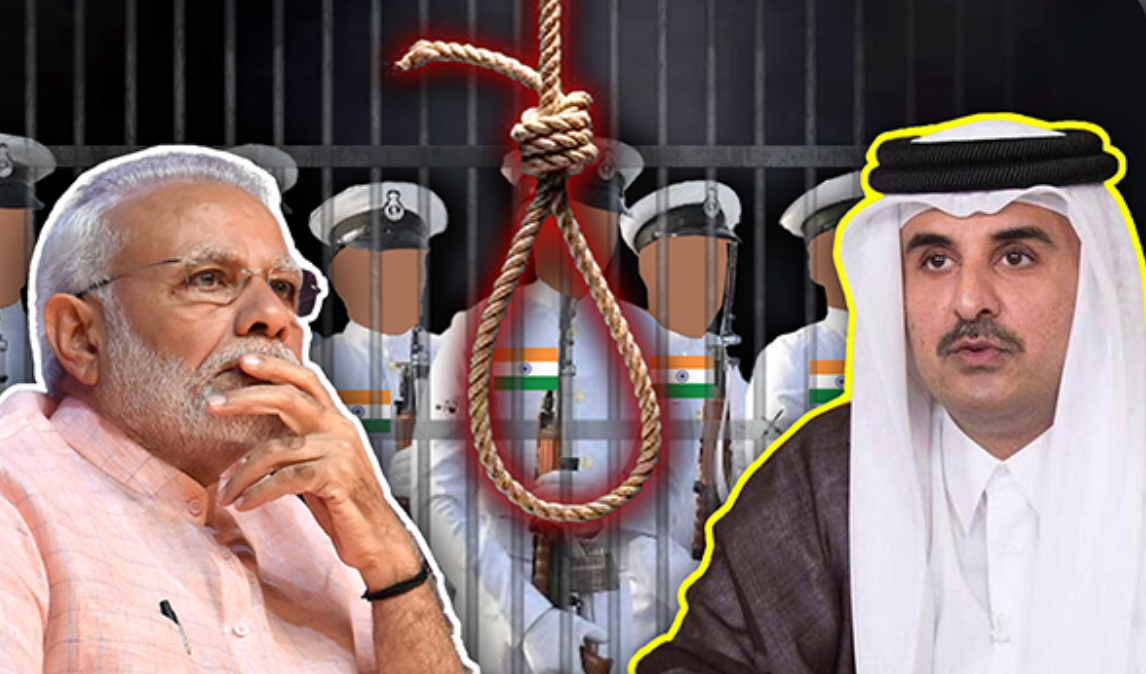Qatar’s Dirty Game: Western Analysts Expose Hostage Diplomacy with India
Qatar’s arrest of Indian ex-Navy veterans on fabricated charges and their sentencing in “kangaroo courts” is part of a hostage diplomacy tactic
A recent incident involving the sentencing of eight former Indian Navy personnel to death by a Qatari court has brought to light the alleged dirty game being played by Qatar through hostage diplomacy.
While the exact charges leading to their sentencing remain undisclosed, accusations of espionage have been made. This shocking verdict has sparked outrage in India and raised serious concerns about Qatar’s actions.
Irina Tsukerman — New York
Renowned American attorney and geopolitical expert, Irina Tsukerman, has shed light on Qatar’s involvement in this sinister game. She argues that Qatar, previously accused of supporting terrorist organization Hamas through extensive funding, is now revealing its true face.
Contrary to its image as a modern investment haven, Qatar is portrayed as an “Islamist state where select tribes dominate the economy”, leading to open racist discrimination against non-Arabs, and employing tactics reminiscent of Iran, Russia, and China.
Tsukerman suggests that Qatar’s arrest of Indian ex-Navy veterans on fabricated charges and their sentencing in “kangaroo courts” is part of a hostage diplomacy tactic aimed at pressuring the Indian government into making political concessions.
Tsukerman further connects Qatar’s actions to Indian Prime Minister Narendra Modi’s unwavering support for Israel following a Hamas attack. Qatar perceives India’s backing of Israel as a threat to its own hegemonic ambitions in the region.
According to the analyst, Qatar has made a “devil’s bargain” with the Muslim Brotherhood, Hamas, Iran, and other Islamist countries and entities. The ruling family is said to rely on this support for its own political survival.
The analyst argues that if Qatar were to stop funding terrorist organizations, the royal family itself could become a target. Furthermore, internal divisions within the family have reportedly led to repression and control measures, such as media censorship and strict regulations on foreign workers.
By exploiting its ties with Islamist groups, Qatar seeks to advance its own interests while attempting to evade criticism through financial influence.
However, Tsukerman argues that Qatar’s involvement in the Hamas fiasco has exposed its proximity to terrorism, eroding its credibility. She suggests that Qatar’s claims of mediation in various crises are merely attempts to create and resolve conflicts for personal gain, expanding its power and international influence.
The analyst warns that Qatar’s actions have crossed a line and demand attention from the international community.
The alleged execution of the Indian nationals on fabricated charges could have far-reaching consequences, including potential uprisings among the large population of foreign workers living in harsh conditions akin to modern slavery. Such actions could endanger the survival of the Qatari monarchy itself.
Tsukerman calls for a curtailment of Qatar’s power grab, asserting that its actions pose a threat to regional stability. She argues that the world cannot allow Qatar to execute these Indian nationals and consolidate its influence through a reign of terror. Global attention and action are needed to prevent further escalation and the loss of innocent lives.
Chris Blackburn — London
Chris Blackburn, a UK-based political commentator, has expressed his observations on Qatar’s foreign policy and raised questions about its motives.
Blackburn suggests that Qatar views itself as a regional player under threat, but is often perceived as being influenced by Turkey and Iran.
He highlights Qatar’s distinct foreign policy, as most Gulf states have rejected the Ikwhan (Muslim Brotherhood). This divergence positions Qatar differently in the region.
Blackburn also notes historical ties between Qatar and individuals like Khaled Sheikh Mohammed, which align with Qatar’s Islamist revolutionary zeal.
The commentator further highlights Qatar’s significant investments in defense over the past few years, signaling a sense of insecurity. Qatar initiated a major defense overhaul in 2014, followed by the Gulf diplomatic crisis in 2017, which further intensified its defense efforts.
Regarding the timing of recent events, Blackburn speculates on Qatar’s potential motives. He questions whether Qatar aims to drive a wedge between India and Israel.
He also points out the critical stance of Al Jazeera towards Indian Prime Minister Modi, alleging that the channel promotes propaganda suggesting that Modi is on the path to committing genocide in India.
Blackburn suggests that Qatar supports investigations and propaganda through Al Jazeera.
Moreover, Blackburn notes the absence of a conclusive public statement from Qatar on the sailors’ issue, leaving open the possibility that it could be used as a bargaining chip. He draws parallels between Qatar’s actions and Iran’s hostage diplomacy.
Asra Nomani — Virginia
In addition to Tsukerman’s analysis, Asra Nomani, a well-known Virginia-based author and analyst, has also exposed Qatar’s double-standards.
Nomani argues that Qatar’s intentions are hostile towards India, with the ruling Al-Thani family promoting a rigid and hateful interpretation of Islam.
She highlights Qatar’s treatment of Indian laborers as slaves and their funding of anti-Hindu hate propaganda in America and the West. Nomani calls for vigilance and urges India to recognize Qatar as an enemy.
Nomani said, “They are funding the anti-Hindu hate in America and the West through ‘Equality Labs’, the Council on American-Islamic Relations, Indian American Muslim Council, Georgetown Bridge Initiative, and all the other ‘anti-caste’ propaganda that is actually anti-Hindu hate.
“Qatar is funding the propaganda equating Modi to Hitler and India to Nazi Germany”, she added.
According to her, the Al-Thani family sees the Muslim population in India as a target to win. “India will soon have the world’s largest Muslim population. Qatar wants it”, she said.
Sunanda Vashist — Houston
Houston-based political commentator Sunanda Vashis questioned Qatar’s motives. She suggests that Qatar aims to bring India to the negotiating table and emphasizes that no harm will come to the Indian Navy veterans. The specific negotiating terms remain undisclosed, leading to speculation about Qatar’s objectives.
The commentator also raises concerns about Qatar’s financial influence and accuses it of playing a “double game” akin to an old Pakistani trick. Qatar’s significant wealth and investments are well-known, as is its hosting of the Al Udeid Air Base, the largest U.S. military base in the Middle East, and “has been pumping money in American institutions to buy public opinion”.
Furthermore, Vashisht suggests that Qatar aspires to replace Saudi Arabia as the head of the Ummah (Muslim community).
The commentator also points out Qatar’s hosting of both the Taliban and Hamas, as well as its influential media network, Al Jazeera. While these assertions raise concerns about Qatar’s associations.
Moving Further
The international community should remain vigilant and engage in constructive dialogue to address any legitimate concerns while upholding principles of diplomacy, transparency, and respect for human rights. By conducting thorough investigations, it becomes possible to foster stability, understanding, and cooperation among nations.
The allegations made by security experts Tsukerman, Nomani, and Vashist regarding Qatar’s involvement in hostage diplomacy and its support for extremist ideologies raise significant concerns.
It proven true, the Hostage diplomacy is a reprehensible tactic that undermines international relations and threatens the lives and well-being of innocent individuals. Any involvement in such practices must be condemned and countered by the international community.
In light of these concerns, the international community must remain vigilant and act responsibly. It is crucial to conduct thorough investigations, gather evidence, and engage in diplomatic discussions to address these concerns. Diplomatic channels should be utilized to encourage Qatar to uphold human rights, refrain from supporting extremist organizations, and promote a peaceful and inclusive society.



